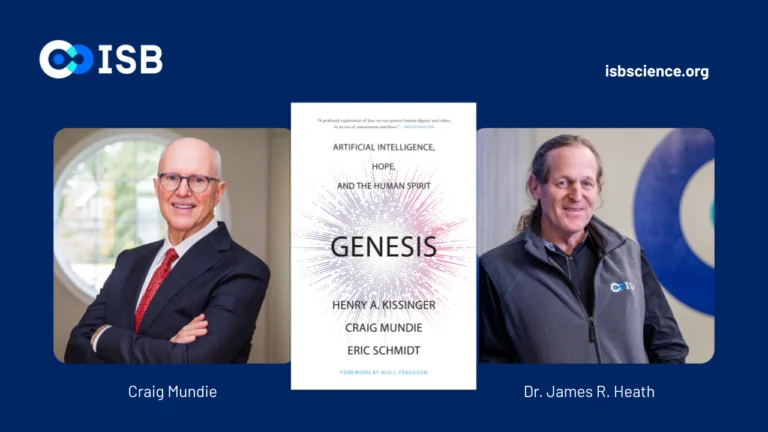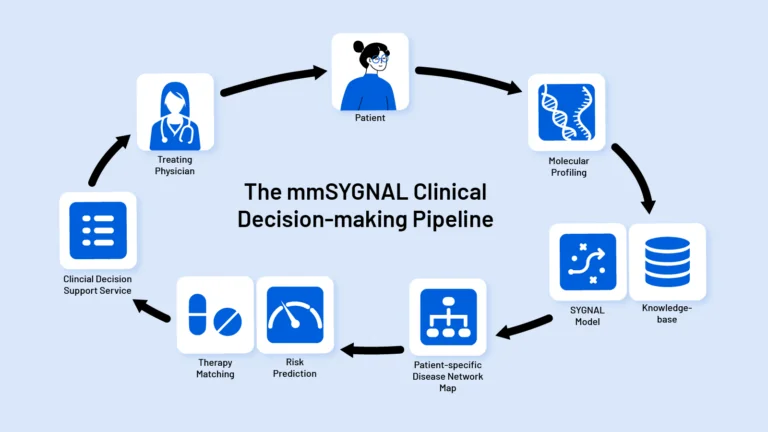Beyond Faulty Genes: Sui Huang Presents a Cancer Paradigm Shift
ISB Professor Sui Huang challenges the long-held belief that genetic mutations primarily drive cancer, offering a fresh perspective that could revolutionize how we think about and treat this complex disease.
Imagine cancer not just as a collection of cells with faulty genes, but as a dynamic system where cells can change their behavior – their very “state” – without any alterations to their underlying DNA. This is the provocative cancer paradigm shift at the heart of a recent ISB Research Roundtable presentation by ISB Professor Sui Huang. Challenging the long-held belief that genetic mutations primarily drive cancer, Huang offered a fresh perspective that could revolutionize how we think about and treat this complex disease.
Huang has a unique background blending molecular and cell biology with theoretical biology, allowing him to tackle cancer from a complex systems perspective. For decades, the central understanding of cancer has revolved around the “genetic paradigm” – the idea that mutations in our genes are the main culprits that turn normal cells into cancerous ones, fueling the development of targeted therapies.
However, as Huang explained, the success of these targeted therapies has been limited. While some patients initially respond well, the cancer often returns, sometimes more aggressively, leading researchers to question whether the genetic story is the whole story.
Huang suggests that we should look beyond individual gene mutations and consider the broader context of how cancer cells operate within the body.
Beyond Mutations: Understanding Cancer Cell Behavior
He used a simple analogy: Imagine a grocery shopper with a stuffed cart in the express checkout lane. We might initially assume they have a fundamental flaw, like being unable to read or count. But perhaps the more accurate explanation is simply that they choose to behave that way. Similarly, Huang proposes that cancer cells may not just be defined by their genetic errors, but by the overall state they adopt. This state encompasses the activity of all their genes and how they interact with their environment.
This concept of “cell state” is crucial. Just as the cells in our body differentiate to perform various functions (skin cells, nerve cells, etc.), all with the same underlying DNA, cancer cells can also shift between different states. These state changes, he argues, can be triggered not only by genetic mutations but also by stress from treatments or signals from their surroundings.
This plasticity – the ability of cells to change – could explain why cancers can become resistant to drugs. Instead of just a few genetically resistant cells surviving treatment, the remaining cells might change their state to become more resilient.
Huang drew parallels to complex systems like societal uprisings or the war on terror, where simply trying to eliminate the “bad actors” can sometimes lead to unintended and negative consequences, even strengthening the opposition. Similarly, aggressively killing cancer cells with treatments like chemotherapy might inadvertently push surviving cells into more aggressive states.
Implications for Treatment
So, what does this cancer paradigm shift mean for treating the disease? Huang suggests a shift in focus. Instead of solely aiming to kill every last cancer cell – a goal that is often impossible – we might explore therapies that aim to reprogram cancer cells, nudging them back toward a normal state or making them more susceptible to the body’s own immune defenses. He highlighted promising research into drugs that modulate the environment around the tumor, making it less supportive of cancer growth and more receptive to immune attack.
Huang’s “beyond the genetic paradigm” view offers a more nuanced understanding of cancer’s complexity. It acknowledges that cancer is not just a disease of faulty genes but a dynamic interplay between cells and their environment, where the ability of cancer cells to change their state plays a critical role in its development and resistance to treatment.
By embracing this broader perspective, researchers hope to unlock new, more effective ways to manage and overcome this challenging disease.
Huang delivered a presentation, followed by a compelling Q&A conversation hosted by ISB Professor Nitin Baliga, during a Research Roundtable event. You can watch it in full here, or by playing the video at the top of this page.
About Research Roundtable
ISB hosts several Research Roundtable conversations each year featuring our leading scientists discussing their latest research.
These free virtual events are designed for a general audience and provide an environment to ask questions directly to our ISB researchers.
Past Research Roundtable topics include the human gut microbiome, precision cancer care and breakthroughs in cancer immunotherapy, complex bacterial communities, long COVID, COVID’s impact on pregnancy, Alzheimer’s disease, finding drugs to treat tuberculosis, and more. You can explore all past Research Roundtable talks and our other events here.


